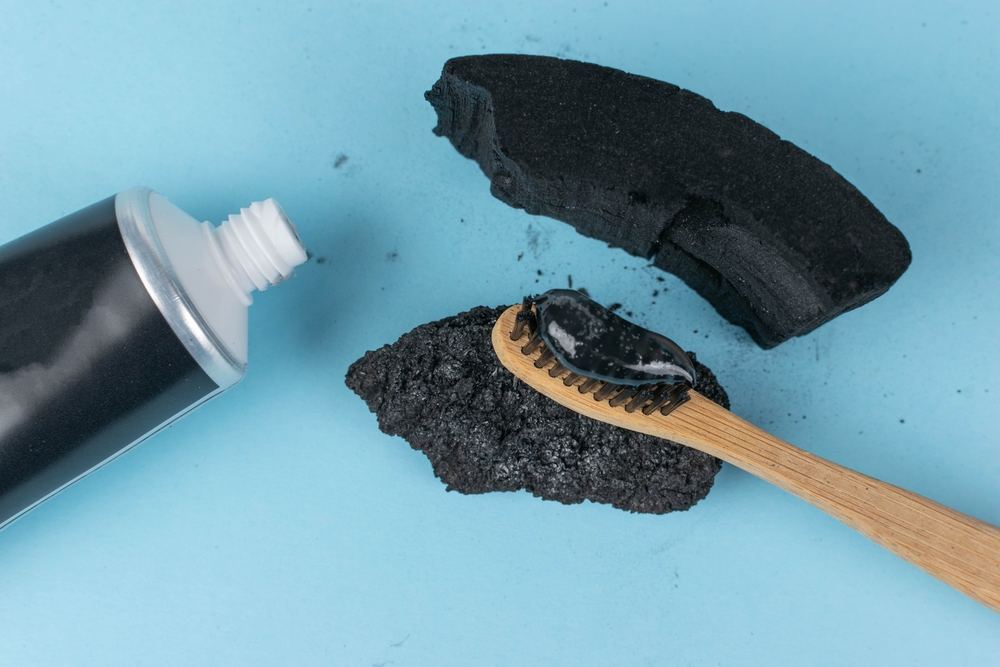Activated charcoal has become a key ingredient in modern skincare, promising to draw out impurities, unclog pores, and reduce excess oil. Its absorbent properties allow it to bind with dirt and toxins, making it a popular addition to facial masks, cleansers, and scrubs. However, while it can leave skin feeling deeply cleansed, excessive use may strip away essential oils, leading to dryness or irritation.
Dermatologists caution that activated charcoal does not discriminate between harmful substances and beneficial compounds. Some skincare formulations may become less effective when combined with this highly absorbent ingredient, as it could diminish the impact of moisturizing agents or active skincare compounds. Despite its detoxifying reputation, activated charcoal should be used in moderation to maintain skin health.
Dental applications and concerns
Charcoal-based toothpaste and powders have gained traction in the dental industry, primarily marketed for their whitening effects. The abrasive texture of activated charcoal helps lift surface stains from teeth, offering a natural alternative to chemical whitening treatments. Additionally, its odor-absorbing properties may help freshen breath by neutralizing bacteria.
However, dental professionals remain skeptical about its long-term safety. Frequent use of charcoal toothpaste can erode enamel, leading to increased tooth sensitivity and a higher risk of decay. Additionally, some studies suggest that charcoal particles may become trapped in microscopic crevices of dental work, potentially causing staining rather than preventing it. While activated charcoal may offer temporary cosmetic benefits, it is not a substitute for fluoride-based dental care, which is essential for enamel protection.
Medical applications and limitations
In emergency medicine, activated charcoal has long been used as a treatment for poisoning and drug overdoses. Its porous structure enables it to bind with toxins in the digestive system, preventing absorption into the bloodstream. This ability has made it a staple in hospitals and poison control treatments.
Despite its effectiveness in acute cases, activated charcoal is not a universal antidote. It does not bind well with all toxins, including alcohol, heavy metals, and certain corrosive substances. Moreover, its powerful absorption properties can interfere with prescription medications, reducing their efficacy. Individuals taking daily medications should be cautious about consuming charcoal supplements, as they may unintentionally hinder the effectiveness of critical treatments.
Environmental applications
Beyond health and beauty, activated charcoal plays a significant role in water filtration. Its ability to trap contaminants and remove impurities has made it a popular choice for home filtration systems and large-scale purification plants. Many water filters utilize activated charcoal to improve taste and eliminate harmful chemicals such as chlorine and volatile organic compounds.
However, the filtration process is not without its drawbacks. While activated charcoal is excellent at absorbing certain toxins, it does not effectively remove all contaminants, including bacteria and heavy metals. Additionally, it may strip water of essential minerals that contribute to hydration and overall health. Understanding the strengths and limitations of charcoal-based filtration helps consumers make informed decisions about their water purification methods.
Safety considerations
Despite its widespread use, activated charcoal is not entirely risk-free. When consumed in excessive amounts, it can lead to digestive discomfort, including bloating and constipation. Additionally, because it binds with various compounds, it may inadvertently reduce the absorption of essential nutrients when taken as a supplement.
The growing trend of DIY activated charcoal applications raises additional concerns. Homemade toothpaste, face masks, and detox drinks often lack proper dosage guidelines, increasing the likelihood of misuse. Health professionals emphasize the importance of following recommended usage instructions to prevent unintended side effects. While activated charcoal can be a valuable tool in skincare, dental care, and detoxification, its safety relies on responsible and informed usage.
Future perspectives
The resurgence of activated charcoal in wellness culture highlights both its potential benefits and its risks. While historical uses have demonstrated its effectiveness in specific applications, modern science continues to refine our understanding of its limitations. As research evolves, the challenge lies in balancing its detoxifying properties with safe and effective usage.
Whether used in beauty routines, medical treatments, or environmental applications, activated charcoal remains a powerful yet misunderstood substance. By approaching it with caution and awareness, individuals can harness its benefits without falling into misleading wellness trends.
















